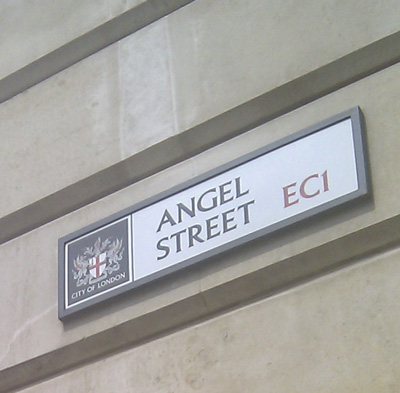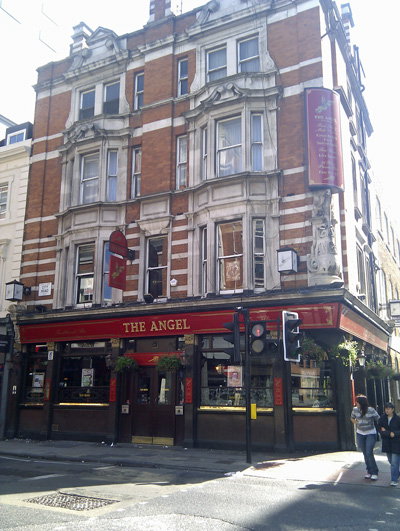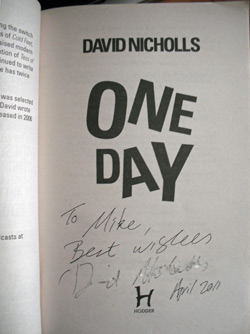I’ve recently been writing a very tricky chapter of The Angel in which Kim falls over and hurts herself and believes it might signify some sort of bad karma — which it may well be bearing in mind what she’s been up to. It’s quite a crucial point in the plot and I’ve found that I’ve put her in a situation that’s full of dilemmas and choices — which I suppose is good for the novel but quite risky to write in case I go off down a blind alley.
I originally wrote it predominantly with dialogue between Kim and James and relatively little interior exposition. When I workshopped this with the ex-City die-hards the majority view was that it would benefit from much more of Kim’s internal debate. (We also had a discussion about whether characters would have ostensibly frank conversations volunteering the number of sexual partners they’d had — which is perhaps the subject for another post.)
So I rewrote the chapter in a very different style — in places with long paragraphs of contemplation about what motivates one through life, etc. I then took advantage of a tutorial with Jenny Mayhew, our first term tutor on the MA at MMU, to get some feedback on the balance between interior/exterior. She thought it was generally about right — which shows the City feedback had helped but that there were some over-long deliberations which could be cut.
Jenny also gave some advice about increasing the amount of ‘stage-direction’ and playing up aspects of the fantasy and dreaming in the dialogue — things I’d deliberately toned down after having feedback in the opposite direction in the previous term. Jenny’s advice tends to echo my natural style and inclination, which is not particularly lean or taut, more observational and discursive.
I re-jigged again and added in some new ideas, some lifted directly from a conversation about different names for common field weeds in England and Scotland. The weeds discussion was in the office in London where I’ve now been working for the past four weeks, of which perhaps more in future posts. Time spent in this job explains the relative lack of blog posts as I’m burning the candle at both ends, catching the 0637 train into Marylebone and not going to bed correspondingly early enough as I’m trying to keep the writing still moving forwards — although to look on the bright side I’m close to some of my locations to return to do easy research.
Last night a dedicated group of the MMU MA students workshopped a revised draft of the chapter following Jenny’s comments (we do this without any tutor involvement from the university so shows we must be relatively dedicated and, to use one of Emma’s horrible HR phrases ‘self-starters’).
I’ve still yet to re-read the transcript of the online discussion, which is always very useful, but the material generated a lot of discussion — it must have done as we ‘chatzied’ for nearly an hour. (To get an hour of four people’s time — plus their reading in advance — on a piece of around 3,000 words was very fortunate — another student had to drop her piece at the last minute.)
We’ve got one more workshopping session left with Emily in about ten days time and then a long break for the summer — the MMU term finishes at the same time. As far as I’m aware, about four people from the City course have finished — or are close to finishing — their novels, including two who are in the workshopping group. Another four or five of us are making steady progress but aren’t there yet.
I must have written enough words for a respectable length novel — as an example I extended the original 2,500 word extract mentioned above by at least another 2,000 words in the rewriting — and I’m sure I can find a use for much of that, if not in the original chapter then elsewhere.
In our MMU workshopping session last night one of the other students presented a chapter-by-chapter breakdown of her projected novel, which reminded me that I’m long overdue a re-assessment of where I’m at. I don’t feel I’ve diverged too much from the original plot that I planned out with post-it notes well over a year ago but I’ve probably only covered about half the planned events or chapters, although what I’ve written has expanded in word count beyond that which what I originally anticipated.
Maybe because of Kim’s interest in karma, I’ve been noticing a few instances of Angel-related serendipity to inspire me to keep plugging on with the writing.

The first was the name of a street I noticed in the City near Pasternoster Square and opposite bombed-out Christ’s Church Greyfriars, where I’m planning to have James and Kim sit and have a drunken conversation on their first day together — the street is, appropriately, Angel Street.

Then I also belatedly noticed that the pub over the road from Mike B’s wonderfully stylish apartment near Old Street where we’ve been meeting to do our Saturday workshops is also called, you guessed, The Angel — although looking like a traditional London boozer it’s a very different sort of Angel to the thatched country local I’m going to write about — but it’s a nice co-incidence anyway.

And, just for completeness, although there’s no special connection to me, here’s another Angel — this time in Bicester. This is a town that Emma would never dream of living in but she goes there fairly regularly to snap up a few bargains or ten at Bicester Village — outlet store shopping centre for all brands she likes to dress in. Perhaps James might slope off for a pint there while she browses in Alexander McQueen, Diesel, Jimmy Choo, , Karen Millan, Radley, Hobbs, maybe buying Kim a cheap Superdry T-shirt and perhaps even nipping into Agent Provocateur.

